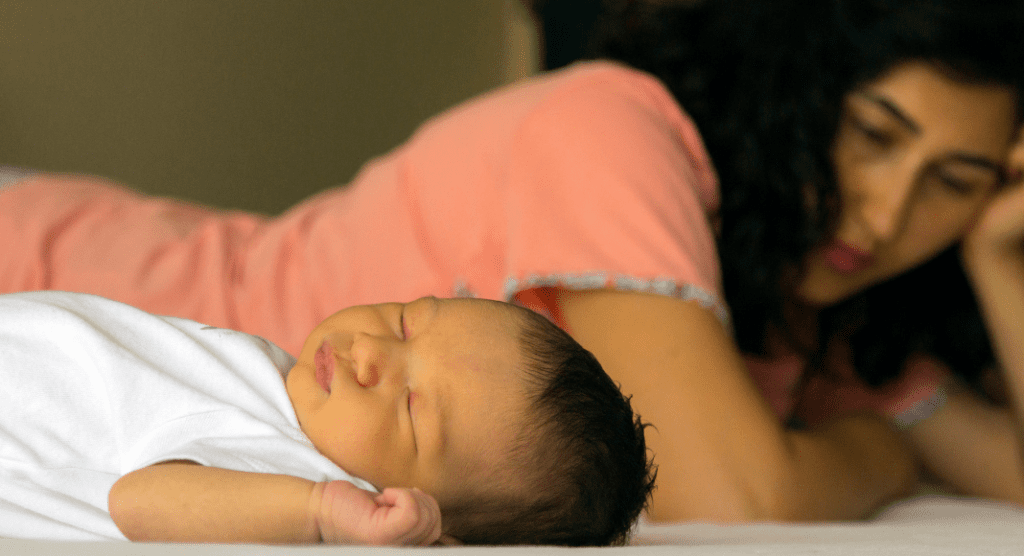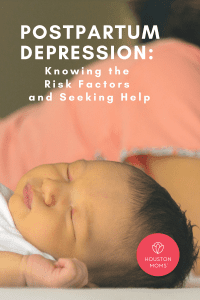When I started doing some research about Postpartum depression (PPD) for Mental Health Awareness Month I found that there are no clear statistics about how many people suffer from this mood disorder. Why is that? My guess is, for all of the people diagnosed with PPD, there are just as many who go undetected.
 Speaking from personal experience, PPD is sneaky. It preys on vulnerable parents who have just experienced perhaps the most trying time in their life. They might feel exhausted, disoriented, and suddenly faced with an entirely new life and landscape that they had no idea how to prepare for. For the birthing parent, hormones can be raging, and their body may feel like a complete stranger.
Speaking from personal experience, PPD is sneaky. It preys on vulnerable parents who have just experienced perhaps the most trying time in their life. They might feel exhausted, disoriented, and suddenly faced with an entirely new life and landscape that they had no idea how to prepare for. For the birthing parent, hormones can be raging, and their body may feel like a complete stranger.
That was the experience of becoming a mother for me. I could not immediately connect with the love and elation that so many people told me I would feel when I saw my baby for the first time. Yes, I loved him. I would have thrown myself in front of a bus for him immediately. But I wasn’t bursting at the seams like I was promised.
I felt scared and confused, isolated, and totally unprepared. It wasn’t due to lack of preparation either. I read all of the books, blogs, and Instagram posts I could get my hands on. But there’s just nothing that can prepare you for going from childless to parent in an instant.
I felt like my entire life before I had children had been ripped out from under me. Who was this new person? Why was she so angry and anxious?
What is Postpartum Depression?
There are some risk factors for predicting if someone could be prone to PPD, such as a history of depression, bipolar disorder, previous PPD, family history of depression or mood disorders, stress, baby’s health problems or special needs, multiple births, difficulty breastfeeding, relationship problems, a weak support system, financial difficulties, or an unplanned or unwanted pregnancy. The truth is, it can happen to anyone. What’s important to know is it isn’t your fault and you aren’t alone.
The thing that took me so long to get help was believing that this was just my life now. Yes, newborn life, that first year, is so hard. It doesn’t mean that you’re doing anything wrong.
According to the Mayo Clinic, if you’re experiencing symptoms like depressive mood or mood swings, excessive crying, difficulty bonding with your baby, withdrawal from family and friends, loss or unusual gain of appetite, too much or too little sleep, overwhelming fatigue, reduced interest and pleasure in things that used to interest you, intense irritability and anger, feelings that you’re not a good mother, hopelessness, feelings of worthlessness, shame, guilt or inadequacy, diminished ability to think clearly, concentrate or make decisions, restlessness, severe anxiety or panic attacks, thoughts of harming yourself or baby, or recurrent thoughts of death or suicide it might be more than just the baby blues.
While the baby blues are categorized as mood swings, anxiety, sadness, irritability, feeling overwhelmed, crying, reduced concentration, appetite problems, and trouble sleeping, it typically secedes within a couple of weeks (Mayo Clinic). I didn’t realize that I had been dealing with PPD until my baby was 8 months old and I had a total meltdown at family Christmas. My baby wouldn’t take a nap and I couldn’t stop crying.
Why did it take me so long to realize? I just thought it wasn’t that bad. I could get myself out of bed in the morning. My baby and I were both eating and sleeping. I wasn’t miserable all of the time. I loved and genuinely enjoyed my new baby.
I just didn’t quite feel like myself. I couldn’t go a day without breaking down sobbing. I knew something wasn’t quite right but I didn’t know what to do. My partner didn’t know what to do. This wasn’t part of the newborn care class we took in the weeks leading up to our son’s birth.
Preparing the Second Time
I didn’t seek help the first time around because I didn’t even realize how bad it had gotten, or rather, that it had never gotten better. So when I got pregnant for a second time I started preparing right away.
Knowing what to expect helped. I know that sleep deprivation is my number one trigger, so my husband started taking over nighttime toddler duty so I could get some rest.
My anxiety tends to escalate quickly, so practicing yoga and meditation keep it from overwhelming me. But perhaps most importantly this time around, I had a strong support network.
When I had my oldest child, I still didn’t know a lot of other parents. But over the last couple of years, more of my friends have had kids. I’ve had the opportunity to become part of an amazing village of women and parents who were there for my family in those early newborn days and weeks with visits, phone calls, texts, and meals.
You’re Not Alone
Let people help if they offer. Ask for help if they don’t. And if you’re struggling with postpartum depression, no matter how mild or severe, speak with your healthcare provider. Seek out mental health support. No one is meant to do this alone, and you don’t have to suffer in silence.
Resources
If at any point you have thoughts of harming yourself or your baby, immediately seek help from your partner or loved ones in taking care of your baby and call 911 or your local emergency assistance number to get help (Mayo Clinic).
Texas Chapter of Postpartum Support International
Citations
Mayo Clinic Staff. (2018, September 1). Postpartum depression. Mayo Clinic.













